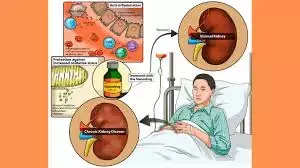- Home
- Medical news & Guidelines
- Anesthesiology
- Cardiology and CTVS
- Critical Care
- Dentistry
- Dermatology
- Diabetes and Endocrinology
- ENT
- Gastroenterology
- Medicine
- Nephrology
- Neurology
- Obstretics-Gynaecology
- Oncology
- Ophthalmology
- Orthopaedics
- Pediatrics-Neonatology
- Psychiatry
- Pulmonology
- Radiology
- Surgery
- Urology
- Laboratory Medicine
- Diet
- Nursing
- Paramedical
- Physiotherapy
- Health news
- Fact Check
- Bone Health Fact Check
- Brain Health Fact Check
- Cancer Related Fact Check
- Child Care Fact Check
- Dental and oral health fact check
- Diabetes and metabolic health fact check
- Diet and Nutrition Fact Check
- Eye and ENT Care Fact Check
- Fitness fact check
- Gut health fact check
- Heart health fact check
- Kidney health fact check
- Medical education fact check
- Men's health fact check
- Respiratory fact check
- Skin and hair care fact check
- Vaccine and Immunization fact check
- Women's health fact check
- AYUSH
- State News
- Andaman and Nicobar Islands
- Andhra Pradesh
- Arunachal Pradesh
- Assam
- Bihar
- Chandigarh
- Chattisgarh
- Dadra and Nagar Haveli
- Daman and Diu
- Delhi
- Goa
- Gujarat
- Haryana
- Himachal Pradesh
- Jammu & Kashmir
- Jharkhand
- Karnataka
- Kerala
- Ladakh
- Lakshadweep
- Madhya Pradesh
- Maharashtra
- Manipur
- Meghalaya
- Mizoram
- Nagaland
- Odisha
- Puducherry
- Punjab
- Rajasthan
- Sikkim
- Tamil Nadu
- Telangana
- Tripura
- Uttar Pradesh
- Uttrakhand
- West Bengal
- Medical Education
- Industry
Maintenance haemodialysis lowers Albumin redox state and oxidative stress among CKD patients

Maintenance haemodialysis may reduce oxidative stress and Albumin redox state among CKD patients suggests a new study published in the BMC Nephrology.
Maintenance haemodialysis patients have increased morbidity and mortality which is mainly driven by an elevated inflammation level due to the uraemic milieu. A major part of this increased inflammation level is the degree of oxidative stress which can be assessed by albumin redox state (ARS). Aim of this study was to evaluate how the ARS is affected by a haemodialysis treatment and different dialyzer properties.
ARS was determined before and after haemodialysis treatment by fractionating it into reduced human mercaptalbumin (HMA), reversibly oxidized human non-mercaptalbumin 1 (HNA-1), and irreversibly oxidized human non-mercaptalbumin 2 (HNA-2) by high-performance liquid chromatography. In healthy individuals, albumin circulates in the following proportions: HMA 70–80%, HNA-1 20–30% and HNA-2 2–5%. High flux (FX 100 [Fresenius Medical Care], BG 1.8 [Toray], Xevonta Hi 18 [B. Braun], CTA-2000 [Kawasumi]) and low flux FX10 [Fresenius Medical Care] dialyzers were used.
Results
58 patients (59% male, median age 68 years, median time on haemodialysis 32 month) were included in the study. Before haemodialysis treatment, HMA (median 55.9%, IQR 50.1–61.2%) was substantially lower than in healthy individuals. Accordingly, oxidized albumin fractions were above the level of healthy individuals (median HNA-1 38.5%, IQR 33.3–43.2%; median HNA-2 5.8%, IQR 5.1–6.7%). Before haemodialysis treatment HMA was significantly higher in patients usually treated with high flux membranes (p < 0.01). After haemodialysis treatment there was a significant increase of HMA and a decrease of HNA-1 and HNA-2 (p < 0.01). These effects were more pronounced in patients treated with high flux dialyzers (p < 0.01). There were no differences of ARS alteration with regard to the dialyzer´s sterilization mode or the presence of diabetes.
The study confirms that the ARS is positively altered by haemodialysis and shows for the first time that this effect depends on dialyzer properties.
Reference:
Boss, K., Paar, M., Waterstradt, K. et al. Albumin redox state of maintenance haemodialysis patients is positively altered after treatment. BMC Nephrol 24, 273 (2023). https://doi.org/10.1186/s12882-023-03317-9
Keywords:
Maintenance, haemodialysis, reduce, oxidative, stress, Albumin, redox, state, among, CKD patients, BMC Nephrology, Boss, K., Paar, M., Waterstradt, K, BMC Nephrology
Dr. Shravani Dali has completed her BDS from Pravara institute of medical sciences, loni. Following which she extensively worked in the healthcare sector for 2+ years. She has been actively involved in writing blogs in field of health and wellness. Currently she is pursuing her Masters of public health-health administration from Tata institute of social sciences. She can be contacted at editorial@medicaldialogues.in.
Dr Kamal Kant Kohli-MBBS, DTCD- a chest specialist with more than 30 years of practice and a flair for writing clinical articles, Dr Kamal Kant Kohli joined Medical Dialogues as a Chief Editor of Medical News. Besides writing articles, as an editor, he proofreads and verifies all the medical content published on Medical Dialogues including those coming from journals, studies,medical conferences,guidelines etc. Email: drkohli@medicaldialogues.in. Contact no. 011-43720751


